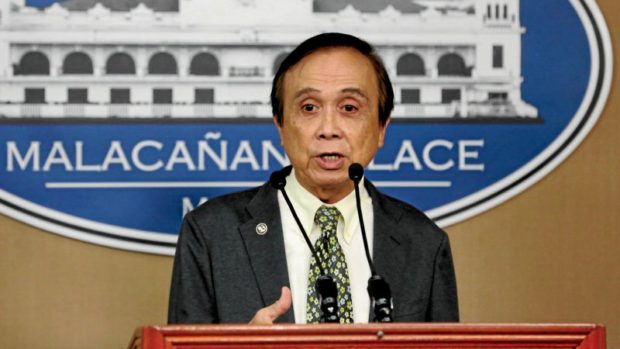
Socioeconomic Planning Secretary Ernesto M. Pernia (File photo by JOAN BONDOC / Philippine Daily Inquirer)
The country’s chief economist has urged the Cabinet members of the Duterte administration to push for “pro-poor” programs and legislation that will allow the robust economic growth to trickle down to most Filipinos.
In a statement Wednesday, the National Economic and Development Authority (Neda) said that Socioeconomic Planning Secretary Ernesto M. Pernia “highlighted the need for economic growth to be felt by majority of Filipinos, especially the poor.”
The past few years saw the economy expanding at among the fastest pace in the region, averaging above 6 percent from 2010. The gross domestic product grew by an average of about 6.5 percent during the first half.
“While sustained economic growth is a necessary condition for poverty and inequality reduction or inclusive growth, it is not sufficient. Economic growth must be complemented by well-thought-out pro-poor programs to meaningfully lead to inclusive development,” said Pernia, who also heads the state planning agency Neda.
The poverty incidence rate of 21.6 percent in 2015 was among the highest in Asean, Neda noted.
As such, Pernia said the following government programs must be “further enhanced” in order to become “more effective” in reducing poverty, namely: conditional cash transfer; free tuition in state universities and colleges through judicious implementing rules and regulations; K to 12; as well as the responsible parenthood and reproductive health law.
The Neda chief also pushed for the prioritization of the following: the comprehensive tax reform program; eased restrictions on foreign investments; lifting of the import quota or quantitative restrictions on rice; and reduction in the cost of doing business.
In line with this, Pernia sought the President’s issuance of specific instructions that will implement Executive Order (EO) No. 5, which mandated the implementation of the Neda-led Philippine Development Plan (PDP) 2017-2022.
“We need bold decisions followed through by bold actions. Now is the time. We have a President with unprecedented popularity and trust ratings due to his audacity and heart for the poor. There can be no better time,” Pernia said.
The PDP 2017-2022 targets 7-8 percent gross domestic product (GDP) growth in the medium term by pursuing the Duterte administration’s 10-point socioeconomic agenda ultimately aimed at reducing the poverty incidence to 14 percent in 2022.
As for job creation, the PDP 2017-2022 wanted to reduce unemployment to as low as 3-5 percent by 2022 from 5.5 percent last year.
The PDP 2017-2022 was the first medium-term development plan anchored on the “AmBisyon Natin 2040.”
President Duterte earlier adopted the AmBisyon Natin 2040 as the long-term vision for the Philippines, such that “by 2040, the Philippines shall be a prosperous, predominantly middle-class society where no one is poor.” JPV